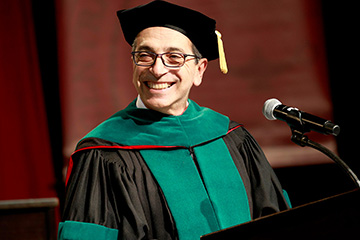CMU pediatricians lead the way in COVID-19 research for children
$1.5M in federal grants awarded to diagnose and manage severe illness
Pediatrics professors in Central Michigan University's College of Medicine are researching a method to fundamentally change the diagnosis and management of severe COVID-19 related illness in children using saliva samples.
The study is one of only eight in the nation funded by the National Institutes for Health to develop approaches for identifying children at high risk for Multisystem Inflammatory Syndrome in Children (MIS-C), a rare and severe after-effect of COVID-19 or exposure to the virus that causes it.
Dr. Usha Sethuraman, co-principal investigator, professor of pediatrics at the CMU College of Medicine, and University Pediatricians emergency department physician at the Children's Hospital of Michigan, and her team are studying the role of salivary biomarkers known as miRNA, cytokines (indicators of inflammation), plus Artificial Intelligence to develop a predictive model of severe COVID-19 disease.
"If proven effective, this will be a game-changer because this model could be used in health care settings to identify those children most likely to develop severe COVID-19 related disease," Dr. Sethuraman said. "University Pediatricians serves the inner-city population of Detroit, one of the areas hit the hardest by COVID-19 in Michigan. We have an opportunity to dramatically improve the care and long-term outcomes of these children."
While COVID-19 has impacted adults more than children, MIS-C does occur in children exposed to COVID-19. More than 1,500 children in the U.S. have developed MIS-C, and some have required critical care. In severe cases, MIS-C has caused heart dysfunctions with long-term implications.
Dr. Sethuraman said that early recognition is the key to successfully managing the disease and ensuring positive outcomes.
"For a health care provider, it is difficult to distinguish the one child who is going to develop severe disease," she said. "All of the current screening tools lack sensitivity and specificity, and those tests involve blood draws. The model we are researching is completely non-invasive, requiring only two saliva samples."
Artificial Intelligence also will be used in the predictive model to integrate a child's social, demographic, clinical and laboratory data, along with miRNA and cytokines from the child's saliva. One of miRNA's functions in the body is to regulate the inflammatory process in response to infection. Investigators want to see if there is a difference in the levels of salivary miRNA and cytokines in children with severe infection compared to those with mild cases of the disease.
Integrating the predictive model into bedside devices makes the prediction readily available to health care providers in settings such as emergency rooms and urgent care facilities.
University Pediatricians practice at the Detroit Children's Hospital of Michigan. Families of children being evaluated in the emergency department of the Children's Hospital for COVID-19 may be approached for enrollment in this study.
"If a family agrees to participate, we will just take two saliva samples from the child and ask the family member to complete a survey," said Dr. Sethuraman.
Dr. Sethuraman encourages families with a child who has a high fever for more than a couple of days along with a rash, vomiting, diarrhea, or red eyes or appears sick, to seek medical care.
The research study was funded through the NIH Eunice Kennedy Shriver National Institute of Child Health and Human Development. The grant is awarded in two phases, providing $735,449 for the first year and, based on funding availability, $698,020 in the second year.
Dr. Sethuraman is one of three co-principal investigators of the study, along with Dr. Steve Hicks, Hershey Pennsylvania State University, and Dr. Dongziao Zhu, Wayne State University. In addition, the four co-investigators are Dr. Kathleen Meert, the CMU College of Medicine's Schotanus Family Pediatric Chair and president of University Pediatricians; Dr. Nirupama Kannikeswaran, CMU faculty member and physician with University Pediatricians; Dr. Srinivasan Suresh, University of Pittsburgh; and Dr. Weihua Guan, Pennsylvania State University.
"We are humbled to receive this award," Dr. Sethuraman said. "It is a great honor for me, my colleagues, for CMU, University Pediatricians, and the Children's Hospital of Michigan. The entire investigative team is excited about this project and the potential outcomes for the health care of children."




